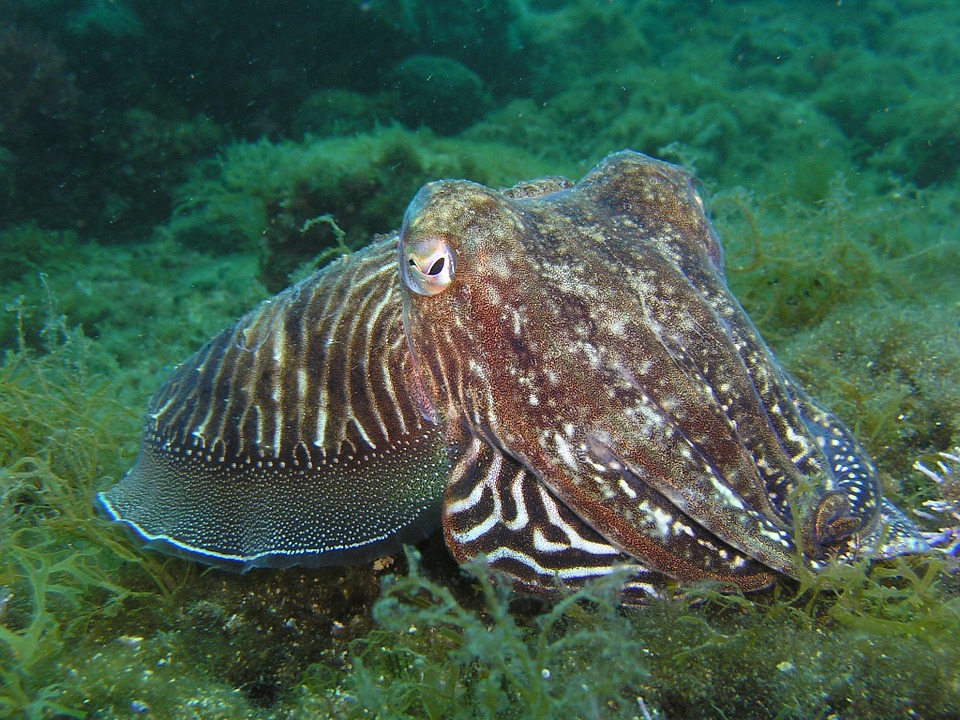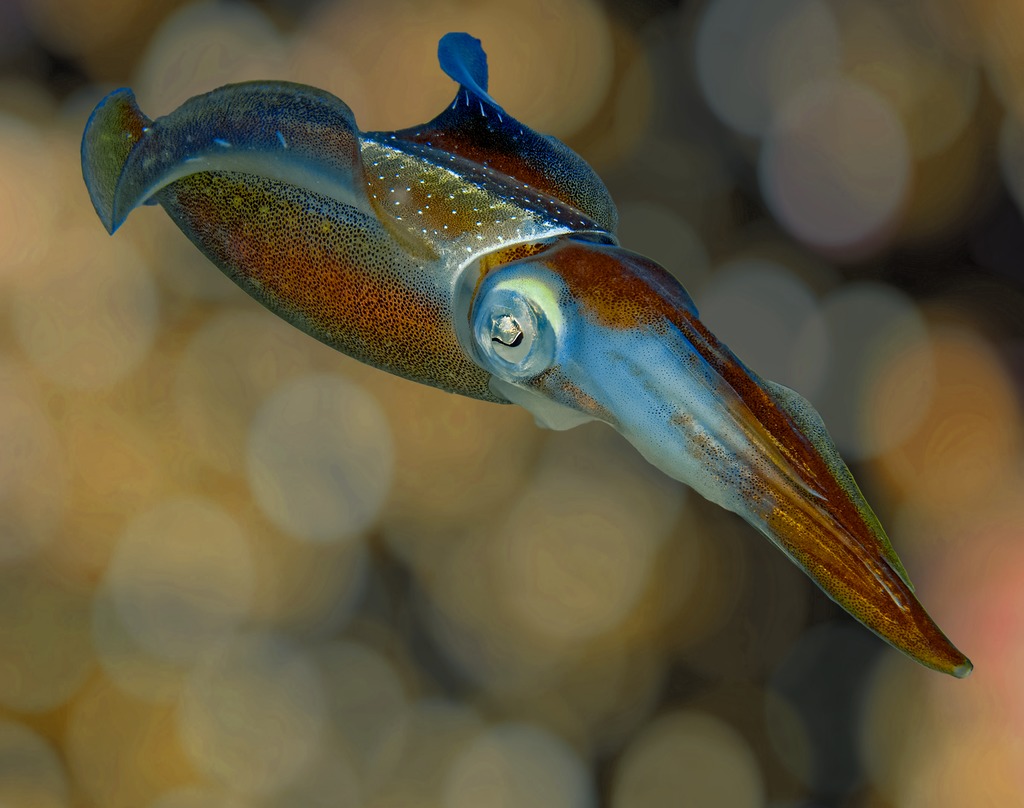Amazing and intelligent Cephalopoda
Originally I planned to write a comprising article about examples of intelligent animal behavior, but soon I realized that it would become way too large (and apart from that I have not enough time to write really long texts these days). Therefore I decided to write smaller articles about single species, genera, families or orders now and then if time allows and in case I am in the mood to do so.
Today let's start with the amazing class of Cephalopda.
Sepia officinalis[1] - member of the order Sepiida ('cuttlefishes').
Source: pixabay
Short overview over the classification of Cephalopda
The class of Cephalopoda[2] (belonging to the phylum Mollusca[3]) contains orders like for example Octopoda[4], Teuthida[5] (with species like the gigantic Architeuthis dux[6] or Mesonychoteuthis hamiltoni[7] which are living in the deep sea and reach lengths of far more than 10 m) and Sepiida.[8]
'Common octopus' (Octopus vulgaris[9]). As the name already discloses octopuses have eight arms (whereas Teuthida and Sepiida have ten).
Source: pixabay
Amazing skills
Even if this article deals above all with the intelligence of some species within the Cephalopoda, I also want to point out two other really striking skills of these animals. Many members of this class ...
-
... are able to change their color very fast. This serves both as camouflage and as communication tool (for example to show to be ready to mate).
They change their color by means of many thousands of color-changing cells called chromatophores just below the surface of the skin. Different chromatophores contain pigments of different colors. A complex array of nerves and muscles regulates which pigments are expanded and thus more visible and which are contracted and less visible. In addition there are iridophores with stacks of reflecting plates that create iridescent greens, blues, silvers and golds. Finally the leucophores mirror back the colors of the environment, making the animal less salient.[10] -
... can eject a cloud of ink to confuse attackers like sharks. The dark color of the ink is caused by its main constituent, melanin.[11]
There are many other noteworthy skills respectively traits, for example that the very high-performance eyes of cephalopods have no blind spot and are able to perceive the polarization of light.
Their blood has a bluish color because it contains hemocyanin[12] (instead of 'our' red hemoglobin.[13]) to transport O2. Jacques-Yves Cousteau, explorer and ecologist, who spent much time observing octopuses, still was of the opinion that using hemocyanin was an evolutionary disadvantage, because hemocaynin is less effective in transporting O2 than hemoglobin.[14] Nowadays we know that hemocyanin has advantages as well, for example it works better in lower oxygen environments and performs superior at colder temperatures.[15]
'Caribbean reef squid' (Sepioteuthis sepioidea[16]). While most other cephalopods often reside near the bottom of the sea, squids as fast swimmers are living in the pelagic zone of the oceans. Some species even can 'fly' distances of up to 50 m to save energy![17]
By Betty Wills - Own work, CC BY-SA 4.0
Examples of intelligent behavior
Cephalopoda are considered to be the most intelligent invertebrates. Since a long time they are well-liked research objects of neurophysiology, because of their giant axons with diameters of up to 1 mm.[18] According to J. Z. Young and M. J. Wells the central nervous system of an octopus can contain about 170 millions of nerve cells.
Considering that, it may not really be so surprising that these animals do really well in solving different test tasks: they manage to pull out corks of glass jars containing yummy lobsters. If they are in kind of mazes where they see a crab through a pane, they understand that they have to make a circuit to reach the prey instead to try to go directly through the glass.[14]
One Octopus vulgaris had been trained always to chose a red ball instead of a white one to get a reward. Amazingly another octopus who never had to solve this task before learned only by observing its conspecific which ball it should chose, and solved the problem as well (don't forget: we are talking about invertebrates here). Apart from that it actually seems that octopuses are able to differentiate the faces of their keepers from the ones of other persons (tested by wearing different clothes trying to distract the animal).[19]
Let's take a look at some newer researches now:
-
An experiment with 'pharaoh cuttlefishes' (Sepia pharaonis[20]) executed by Tsang-I Yang and Chuan-Chin Chiao of the Tsing Hua University in Taiwan confirmed that these cephalopods can count! If they had the choice between two basins where one of them for example contained four and the other five crabs they chose the one with the higher number of preys. The closer the numbers of crabs in the different basins were the longer the octopuses needed to think prior to their decision which is a clear hint that they really did count (instead of only estimating).[21] Even human infants have problems to deal with sets which differ by only one number ...
-
Very interesting is also the behavior of the 'Larger Pacific Striped Octopus'. Not only that it shows beak-to-beak mating, and couples even share food with each other, but also its way to hunt is amazing - Caldwell and colleagues describe it like that: "Shrimp were caught by extending a dorsal arm slowly, in an arched fashion, lowering it over the front end of the shrimp and touching it on the carapace. During this behavior the hunting arm was curled back at the tip so that the suckers were facing outward and grabbed the shrimp, typically as it retreated backward toward the octopus when tapped."[22] (Movie number 5 on that page shows you how LPSO is hunting!)
-
Do cuttlefishes cheat? Yes! At least male exemplars can. :-)
Male 'mourning cuttlefishes' (Sepia plangon[23]) employ the ability to change their colors (I described it above) in a tactical way to mislead potential concurrents during courtship. They intend to deceive rival males by displaying male courtship patterns to receptive females on one side of their body, and simultaneously displaying female patterns to a single rival male on their other side, pretending to be a 'harmless' female cuttlefish instead of a rival. Brown and colleagues conclude that "The use of tactical deception in such a complex communication network indicates that sociality has played a key role in the cognitive evolution of cephalopods."[24] -
Sometimes they even dare to hunt outside of the water![25] Check the video. :-)
Little octopus in a shell.
It is well known that cephalopods are able to use tools in a methodical way. For example the 'coconut octopus' (Amphioctopus marginatus[26]), living in the Celebes Sea, collects coconut husks to build its home.[27]
Source: pixabay
Sources:
- https://es.wikipedia.org/wiki/Sepia_officinalis
- https://en.wikipedia.org/wiki/Cephalopod
- https://en.wikipedia.org/wiki/Mollusca
- https://en.wikipedia.org/wiki/Octopus
- https://en.wikipedia.org/wiki/Squid
- http://marinebio.org/species.asp?id=156
- http://marinebio.org/species.asp?id=247
- https://en.wikipedia.org/wiki/Cuttlefish
- https://en.wikipedia.org/wiki/Common_octopus
- http://ocean.si.edu/ocean-news/how-octopuses-and-squids-change-color
- https://en.wikipedia.org/wiki/Melanin
- https://en.wikipedia.org/wiki/Hemocyanin
- https://en.wikipedia.org/wiki/Hemoglobin
- Cousteau, Jacques-Yves. Octopus and Squid: The Soft Intelligence. New York City: Doubleday Books, 1973.
- http://hemocyanin.blogspot.de/
- https://en.wikipedia.org/wiki/Caribbean_reef_squid
- http://www.nature.com/news/squid-can-fly-to-save-energy-1.10060
- http://bridgeblog.scientopia.org/2011/09/30/a-neuroscience-field-guide-the-squid-giant-axon/
- Arzt, Volker / Birmelin, Immanuel. Haben Tiere ein Bewusstsein?. Munich: C. Bertelsmann Verlag, 1995.
- https://en.wikipedia.org/wiki/Pharaoh_cuttlefish
- http://rspb.royalsocietypublishing.org/content/283/1837/20161379
- http://journals.plos.org/plosone/article?id=10.1371/journal.pone.0134152
- https://australianmuseum.net.au/mourning-cuttlefish-sepia-plangon-gray-1849
- http://rsbl.royalsocietypublishing.org/content/8/5/729
- http://www.spektrum.de/news/oktopus-bei-der-jagd-an-land-gefilmt/1334414
- https://en.wikipedia.org/wiki/Amphioctopus_marginatus
- http://www.cell.com/current-biology/fulltext/S0960-9822(09)01914-9




Wow! Amazing article with lots of interesting information. Resteemed. :-)
I like your choice of animals a lot as I already saw some of those in real life while doing a diving trip. They are even more impressive once you meet them face-to-face. Have you seen this video of the behaviour you described above?
Thanks for resteeming! :)
I didn't see this exact video yet, but similar ones. Thanks for sharing it!
Octopus are very intelligent creatures
Yes, quite amazing ...
Its amazing just how intelligent these creatures are. I was watching some videos on youtube a while back of an octopus solving puzzles to get to a treat. Quite impressive.
They are so fascinating also because they reached their high level developing on a completely different path of evolution than we did. Therefore it may be less surprising if for example a chimpanzee proves to be intelligent than if an octopus does ...
Yep, exactly. There are so very many things about them that are functionally similar but structurally quite different. Their eyes for instance are very different from ours.
Awesome post, incredible animal.
Nice addition to my article - thanks for commenting! :)
any time! looking forward to more articles from you.
I love these animals! As you wrote, they are intelligent and funny! They even can prdict football results, one says. Unfortunately their lifes are very short. So they can hardly bring their intelligene to maturity.
Thanks for this post, mate!
Yes, indeed, really fascinating animals! I am glad to know that you enjoyed to read my article! :)
That's the real reason for my betting success: some people think I would use any 'secret' formulas, but instead I just own a few octopuses at home! ;-)lol :D Finally, you revealed your secret to the world.
Excellent article. I agree, shorter posts are better to keep interest for the reader.
I love steemit.
OK, finally this article happened to be rather long as well - but I just don't like to be too superficial ... :)
I really like how detailed and well-researched this article is.
nice post :) as I always say nature is awesome ;) keep up the good work!
Thanks! :)
ficou perfeito admiro a natureza
This is very beautiful
I admit that you are the first time I see it
Really amazing, coll @jaki01